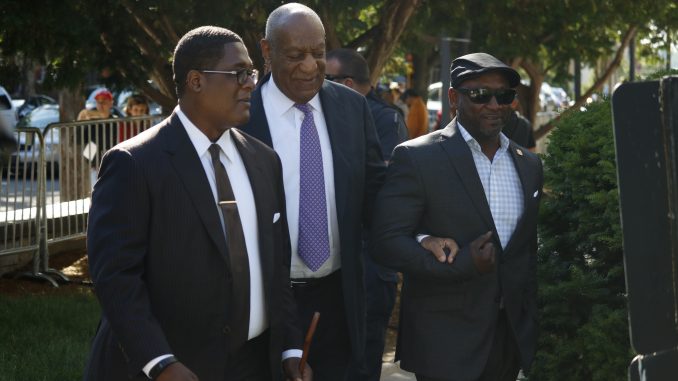
For Lisa Gettings, Temple’s campus holds memories: theater classes, dollar pretzels and, she recalls, the ever-present possibility of seeing Bill Cosby.
The several times she saw him drive through campus, excitement followed. Like Gettings, Cosby was once a Temple student — in 1961 and 1962 — before leaving the university to pursue a television career.
“He represented the success that we could have, if we stayed in school,” said the 1992 alumna.
When Gettings was a student, Cosby served on Temple’s Board of Trustees, a position he would hold for 32 years.
In 2014, Cosby resigned after dozens of women accused him of sexually assaulting them.
At first, Gettings didn’t take the allegations seriously. Then, she noticed how many women came forward— now, a total of 62.
“I felt sick to my stomach,” Gettings said.
Before Cosby resigned, Gettings signed a change.org petition to have him removed from the Board of Trustees.
“The time has come to put an end to this archaic support of rape culture,” Gettings wrote on the petition. “Do nothing and remain complicit? What’s that say about Temple? Nothing good.”
The allegations against Cosby go back decades. In 2015, Sunni Welles accused Cosby of drugging and assaulting her in the mid-1960s.
Last week, Cosby was tried for an alleged sexual assault of former Temple employee Andrea Constand. For five days, the jury was deadlocked, until Montgomery County Judge Steven T. O’Neill declared the case a mistrial. The prosecution immediately announced its intention to pursue a retrial.
“I have, like, a 180-degree opinion of him now,” she said.
When Gettings and Mullane attended college, Cosby’s presence was pervasive, sprinkled into sitcoms and Jell-O commercials.
For John Mullane, Cosby was once a giant.
The 1992 alumnus recalled a movie theater in the basement of Johnson & Hardwick halls — each Thursday, students filled its blue, velvety seats to watch The Cosby Show.
“The Cosby Show has a special appeal to Philadelphians and especially to Temple students and faculty,” 1987 alumna Krys Longan wrote in a Temple News column more than 30 years ago.
“This is our show, folks,” she added.
As Cosby’s success strengthened, his relationship with Temple did the same. He wore Temple sweatshirts on television. In an advertising campaign, he told viewers he could have gone anywhere — “but I chose Temple.” When enrollment increased, University President Peter Liacouras accredited the commercial.
Cosby left Temple in 1962 to pursue his television career, starring first as an undercover agent in “I Spy.” Lew Klein a Temple professor who has taught broadcast and television courses for the past 65 years, said “I Spy” was groundbreaking.
“It was breaking, to some degree, a color barrier that existed in television,” said Klein,
In 1984, Cosby launched The Cosby Show. The sitcom revolutionized the media’s representation of Black families, according to Kenneth Kusmer, a history professor at Temple.
The Huxtables were firmly middle-class: Cliff Huxtable, Cosby’s character, was a successful doctor.
“In these shows, they’re considered to be no different than white people,” said Kusmer, whose research focuses on race in the media.
For Gina Boyer, who studied radio, television and film at Temple, Cosby’s success provided encouragement in the midst of a predominantly white industry.
“His being on TV and being so prominent and successful, and Oprah as well, that made me realize that it could be a possibility for me to go into that industry,” Boyer said.
But later, Boyer became disillusioned with the actor, who was known for his public criticisms of lower-class Black youth. As Boyer began working in the television industry herself, she began hearing rumors that Cosby cheated on his wife. Eventually, she learned of the sexual assault allegations.
“Even though he is so, so much a part of [Temple’s] modern legacy I think there’s definitely a way to move past it,” Boyer said.
While Cosby is gone from the Board of Trustees, his name remains on Temple’s list of honorary degree recipients. Klein supported Cosby’s resignation, but disagrees with the prospect of rescinding the actor’s honorary degree.
“He received it for what he had done for the university,” Klein said. “I mean, you can’t erase the bad things but you can’t erase the good things that he did for the university.”
But alumnae like Gettings and Boyer, who once looked up to the actor, have different opinions: once fans of Cosby, both disapprove of his still-existing honorary degree from Temple.
“The university says a lot by continuing to stay connected.” Gettings said. “It’s not necessarily condoning it, but its inaction practically does condone that.”
Angela Gervasi can be reached at angela.gervasi@temple.edu or on Twitter @AngGervasi. Follow the Temple News on Twitter @TheTempleNews



Temple wouldn’t even still be in existence without Dr. Cosby. They almost went under years ago and he saved them.